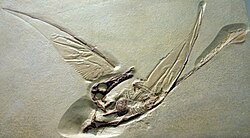Biology:Rhamphorhynchidae
| Rhamphorhynchids | |
|---|---|

| |
| Fossil specimen of Rhamphorhynchus | |
| Scientific classification | |
| Domain: | Eukaryota |
| Kingdom: | Animalia |
| Phylum: | Chordata |
| Order: | †Pterosauria |
| Clade: | †Novialoidea |
| Clade: | †Breviquartossa Unwin, 2003 |
| Family: | †Rhamphorhynchidae Seeley, 1870 |
| Type species | |
| †Pterodactylus longicaudus Münster, 1839
| |
| Subgroups[9] | |
| Synonyms | |
| |
Rhamphorhynchidae is a group of early pterosaurs named after Rhamphorhynchus, that lived in the Late Jurassic. The family Rhamphorhynchidae was named in 1870 by Harry Govier Seeley.[10] Members of the group possess no more than 11 pairs of teeth in the rostrum, a deltopectoral crest that is constricted at the base but expanded at the distal end, and a bent phalange on the fifth toe.[11][12]
Rhamphorhynchidae traditionally contains two subfamilies: the Rhamphorhynchinae and the Scaphognathinae. While not recovered as distinct clades by all analyses, there do appear to be traits uniting members of each group.[9][12] Rhamphorhynchines are more common, were lightly built, and had jaws ending in pointed tips that contained more teeth, which are often procumbent (pointed forward). Scaphognathines are comparatively quite rare, were more robust skeletally, and had shorter wing proportions. The broad-tipped skulls of scaphognathines held fewer teeth which were widely spaced and vertically oriented in the jaw.[12]
Classification
The cladogram (family tree) of rhamphorhynchids below is the result of a large phylogenetic analysis published by Andres & Myers in 2013.[9] Note that this study does not recover Scaphognathinae.
| Breviquartossa |
| |||||||||||||||||||||||||||||||||||||||||||||
References
- ↑ Hone, D. W. E.; Tischlinger, H.; Frey, E.; Röper, M. (2012). Claessens, Leon. ed. "A New Non-Pterodactyloid Pterosaur from the Late Jurassic of Southern Germany". PLOS ONE 7 (7): e39312. doi:10.1371/journal.pone.0039312. PMID 22792168. Bibcode: 2012PLoSO...739312H.
- ↑ Lü, J., Pu, H., Xu, L., Wei, X., ChanG, H., & Kundrát, M. (2015). "A new rhamphorhynchid pterosaur (Pterosauria) from Jurassic deposits of Liaoning Province, China." Zootaxa, 3911(1), 119-129.
- ↑ Lü, J.; Unwin, D.M.; Zhao, B.; Gao, C.; Shen, C. (2012). "A new rhamphorhynchid (Pterosauria: Rhamphorhynchidae) from the Middle/Upper Jurassic of Qinglong, Hebei Province, China". Zootaxa 3158: 1–19. doi:10.11646/zootaxa.3158.1.1. http://www.mapress.com/zootaxa/2012/f/z03158p019f.pdf.
- ↑ Jagielska, N.; O'Sullivan, M.; Funston, G. F.; Butler, I. B.; Challands, T. J.; Clark, N. D. L.; Fraser, N. C.; Penny, A. et al. (2022). "A skeleton from the Middle Jurassic of Scotland illuminates an earlier origin of large pterosaurs". Current Biology 32 (6): 1446–1453.e4. doi:10.1016/j.cub.2022.01.073. PMID 35196508.
- ↑ Unwin, David M. (2006). The Pterosaurs: From Deep Time. New York: Pi Press. p. 246. ISBN 978-0-13-146308-0.
- ↑ Lü Junchang, Fucha, X. and Chen, J. (2010). "A new scaphognathine pterosaur from the Middle Jurassic of western Liaoning, China." Acta Geoscientica Sinica, 31(2): 263-266.
- ↑ Xin Cheng; Xiaolin Wang; Shunxing Jiang; Alexander W.A. Kellner (2012). "A new scaphognathid pterosaur from western Liaoning, China". Historical Biology 24: 101–111. doi:10.1080/08912963.2011.635423.
- ↑ Lü Junchang; Bo Xue (2011). "A New Rhamphorhynchid Pterosaur (Pterosauria) from the Middle Jurassic Tiaojishan Formation of Western Liaoning, China". Acta Geologica Sinica 85 (5): 977–983. doi:10.1111/j.1755-6724.2011.00531.x. http://www.geojournals.cn/dzxben/ch/reader/view_abstract.aspx?file_no=201105002&flag=1.
- ↑ 9.0 9.1 9.2 Andres, B.; Myers, T. S. (2013). "Lone Star Pterosaurs". Earth and Environmental Science Transactions of the Royal Society of Edinburgh 103 (3–4): 383–398. doi:10.1017/S1755691013000303.
- ↑ Seeley, H.G. (1870). "The Orithosauria: An Elementary Study of the Bones of Pterodactyles." Cambridge, 135 p.
- ↑ Unwin, David M. (2003-01-01). "On the phylogeny and evolutionary history of pterosaurs" (in en). Geological Society, London, Special Publications 217 (1): 139–190. doi:10.1144/GSL.SP.2003.217.01.11. Bibcode: 2003GSLSP.217..139U. https://pubs.geoscienceworld.org/gsl/books/book/1594/chapter/107367091/On-the-phylogeny-and-evolutionary-history-of.
- ↑ 12.0 12.1 12.2 Witton, Mark P. (2013). Pterosaurs : natural history, evolution, anatomy. Princeton: Princeton University Press. ISBN 978-1-4008-4765-5. OCLC 842919760. https://www.worldcat.org/oclc/842919760.
Wikidata ☰ Q137266 entry
 |

